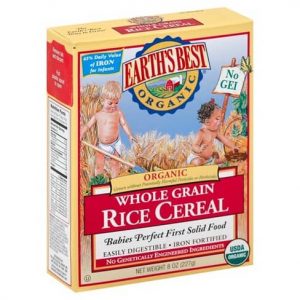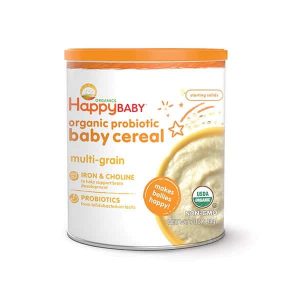Show Contents
Hide Contents
Breast milk thickeners are agents that aid in the thickening or adding consistency to breast milk and infant formula. These may come in the form of powder and also as a gel mix. It thickens the liquid to a level that is similar to nectar or honey. Thickening of milk or baby food avoids gastroesophageal reflux or regurgitation in babies. Some babies need milk or food to be thickened. Thickening makes food easier to swallow and the milk much more comfortable to drink. There are more ways than one to thicken breast milk and baby food, and this guide will help you decide which one will be best for you.
Why use thickeners?
Some children or infants have difficulty and tend to choke on liquids when they drink that is why drinking thickened milk will be a lot safer for them. Breast milk thickeners are used for a couple of reasons. Thickeners also help in solving problems that may be experienced by your little one. Babies who have problems with swallowing often need their milk to be thickened. This problem is referred to as dysphagia. Babies with dysphagia will need to have their milk thickened so they can safely eat or drink.
Thickening expressed breast milk or infant formula also helps in the reduction of acid reflux in babies. Since babies still have an underdeveloped digestive system, breast milk or baby food that are too splashy or watery may tend to flow back up into the esophagus. This causes the baby to spit up, and thickened breast milk will help in reducing this problem. However, thickened are not the primary and sole way to treat reflux in babies. Most importantly, parents are advised to consult a healthcare provider or pediatrician.
The Best Breast Milk Thickeners
1
Gerber Baby Cereal DHA and Probiotic Rice
2
Earth’s Best Organic Infant Cereal, Whole Grain Rice
3
Happy Baby, Happy Bellies Organic Multigrain Cereal
4
Beech-Nut Complete Rice Cereal
5
Gerber Single-Grain Oatmeal Baby Cereal
6
Earth’s Best Certified Organic Whole Grain Oatmeal Cereal
7
Happy Baby Organic Probiotic Baby Oatmeal Cereal with Choline
8
Beech-Nut Cereal Complete Oatmeal
9
USDA Organic Gelmix
10
Thick-It Original Thickener
11
SimplyThick Easy Mix Gel Thickener
12
Thick & Easy Instant Food & Beverage Thickener
How to thicken milk using cereal
Nectar Thick
Use one and a half teaspoons of dry infant cereal for each ounce of formula. Parents must pulverize or ground up infant cereal. Do not use flake cereal.
Honey Thick
Use two and a half teaspoons of dry infant cereal for each ounce of formula. Parents must pulverize or ground up infant cereal. Do not use flake cereal. Do not give real honey to children under one year old.
Considerations
The hospital does not use thickeners for any infants who are younger than two weeks of age, or 42 weeks gestation if they were born prematurely. Extra caution should be observed when using thickeners in children younger than 12 months because their digestive system has not fully developed and are still immature.
Young infants may be limited in the products they can use and the amount of thickening that is safe. If you feed your baby with a bottle, you will need to find the right nipple type and flow rate to use with the thickened liquid. You make ask for your healthcare provider in this matter.
Each thickening agent has different benefits, ingredients, and mixing instructions. Your child’s healthcare provider will recommend a thickening agent based on your baby’s age and weight, the liquid that needs to be thickened (whether it is formula or breast milk), the cost or budget. Your child’s healthcare provider will give you a recipe and show you the correct way to mix the thickener into your child’s feeding liquid. Instructions will also be visible on the packaging of the thickener you will purchase.
Ideal thickness
If the formula is too thin, you are not accomplishing anything except increasing the number of calories per ounce—it will still splash. If the formula is too thick, the baby will not be able to get it out of the bottle and will get tired before she gets full. Pediatricians use these descriptions for the perfect thickness: “stage 1 baby foods” or “tomato sauce.” Commercial thickening companies use the terms “nectar,” “honey” and “pudding.” We tested real fruit nectars and found them to be too thin. Honey was far too thick. Tomato sauce and stage 1 foods are just about right.
Breast milk will thicken up fine, but a few minutes later it gets thin again. There is an enzyme in the breast milk (Amylase) that “digests” cereals and it will get thin after about 5 minutes. If your child chokes on thin liquids, thickening breast milk may help. However, if you want the milk to stay thick, try using commercial thickener made of Xanthan gum. The Munchkin Formula Mixer made it very easy for us to mix the formula that we used. It is cheap, simple and effective, and mixes the cereal completely at the push of a button. We started off with a whisk but switched to this mixer. Pediatricians usually recommend that you add 1 Tablespoon of cereal per every ounce of water; however, some cereals thicken much more than others.
Source: PAGER Association; Rackley et al.
How long should you be using a thickener
Parents or health care providers use breast milk thickeners only for a certain period for most cases. Parents or health care providers even use them for a very short time or only until the baby will no longer have difficulty in swallowing safely. It is always important to consult your pediatrician or healthcare provider on when to stop or continue thickening the milk or food for your baby. Also, observe your baby’s response to the consumption of thickened milk or food.
Don’t stop thickening your child’s food until your child’s healthcare provider or a feeding therapist can test your child’s ability to swallow without problems.
Helpful Tips
- Infant cereal does not mix well with breast milk. The enzymes in breast milk break down the cereal. If you would like to keep breastfeeding or using expressed milk in a bottle, talk to your child’s doctor.
- Check the nipple during the feeding to make sure the cereal has not clogged the nipple. You may need to roll the nipple with your fingers or clean out the clog.
- Talk with your child’s pediatrician o about the different types of oatmeal cereals on the market and how to arrive at a just-right consistency. The amount of oatmeal to add to the liquid (formula, breast milk, etc.) is dependent on your child’s condition. It is essential to follow the recommendations of your pediatrician or feeding therapist.
- When your child is drinking it from a bottle, you may need to go up to a larger nipple size for the thickened milk to flow. Most feeding specialists now recommend either a faster flow nipple or commercially pre-cut, cross-cut nipples provided by the hospital.
- Be sure that your child is sitting in an appropriate position, as it can affect his or her ease and enjoyment with the meal.
- Make sure you are not overfeeding your child. If he or she is gaining weight rapidly, but spitting up a lot, try decreasing the amount at each feeding. Infants with reflux, for example, tend to do better with smaller, more frequent meals.
Source: American Academy of Pediatrics
Pros and cons of thickening
Pros
- Milk/formula may stay down better and reduce the overall amount of acid reflux or choking.
- May eliminate the need for medication.
- Added calories for weight gain (if thickening with cereal).
- May reduce lung complications for infants who aspirate.
- Can help reduce chronic congestion and vomiting.
Cons
- Might can make the choking and aspiration worse (swallow study can reduce this chance).
- The baby may reduce formula/breast milk intake.
- Can decrease formula intake enough that dehydration becomes an issue.
- Often the baby still needs acid reflux medication.
- Can cause constipation (rice cereal).
Risks
Infants taking liquids with thickening agents may face an increased risk of a severe disease called necrotizing enterocolitis (NEC). With NEC, the intestines become inflamed, and intestinal tissue dies. NEC is a life‑threatening condition. Treatment sometimes requires surgery. The U.S. Food and Drug Administration has reported 22 cases of NEC in infants who have taken a thickening agent called SimplyThick. For this reason, SimplyThick should not be used in preterm infants, infants under 12 months of age, children under the age of 12 years with a history of NEC.
Parents have been using infant rice cereal for many years since it is gluten-free and it rarely causes allergic reactions. However, some rice products, including infant rice cereals, may contain high levels of arsenic. Arsenic can harm your baby. To prevent harm, feed your child a well-balanced diet that includes many different grains. This will help lower your child’s risk of overeating of any one food. Also, feed your child only one serving of rice cereal per day. Thickening agents may also cause side effects such as constipation, gassiness, or loose stools. (2015 Intermountain Healthcare, Primary Children’s Hospital. Patient and Provider Publications.)
What to do
Connect with your child’s healthcare provider if you have any questions or concerns about using any of the thickening agents. If your child is using a thickening agent or has used one recently, watch for signs of NEC in your child. Call your healthcare provider right away if your baby experiences are bloating, green-tinged vomit, bloody stools, diarrhea, excessive coughing, and any abnormal behavior or appearance.






